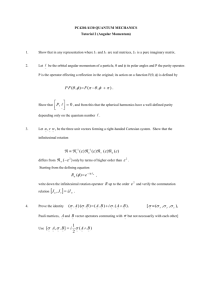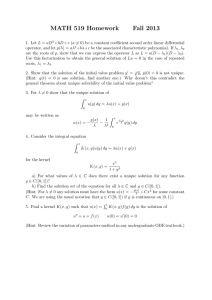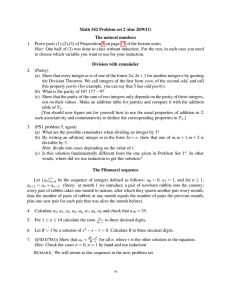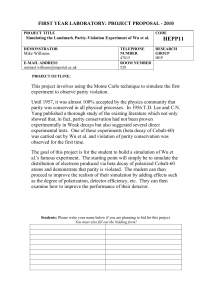Math 223: Problem Set 10 Practice problems (x) = p
advertisement
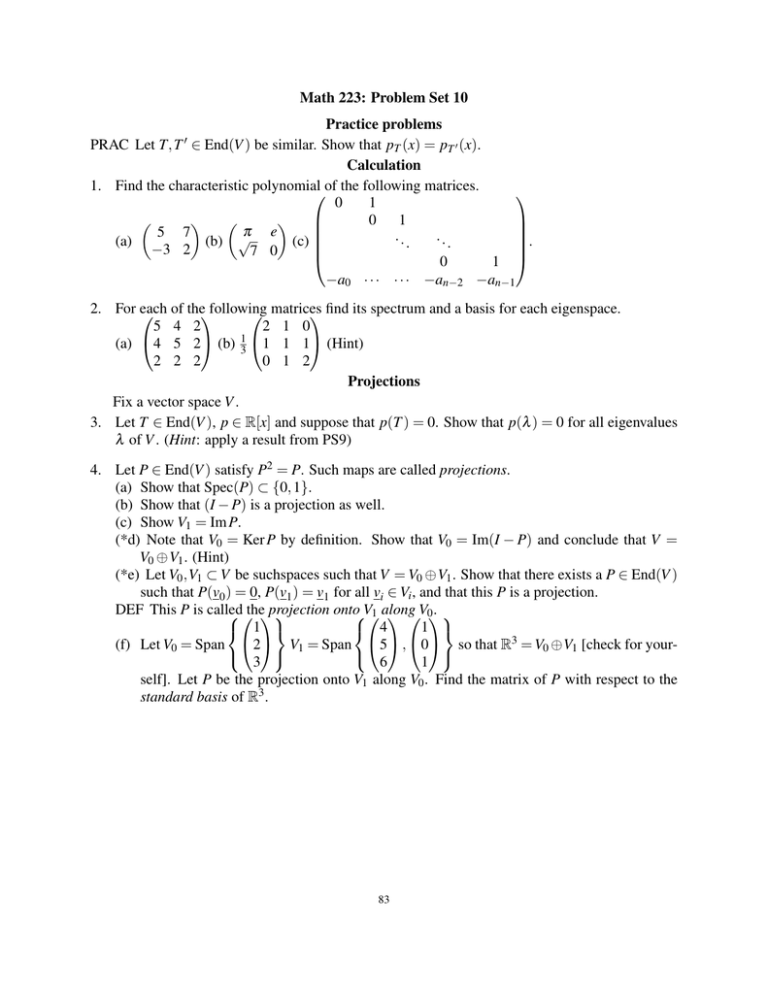
Math 223: Problem Set 10
Practice problems
PRAC Let
∈ End(V ) be similar. Show that pT (x) = pT 0 (x).
Calculation
1. Find the characteristic polynomial
of the following matrices.
0
1
0 1
π
e
5 7
.
.
.
.
.
(c)
(a)
(b) √
.
.
−3 2
7 0
0
1
−a0 · · · · · · −an−2 −an−1
T, T 0
2. For each
find its spectrum and a basis for each eigenspace.
matrices
of thefollowing
2 1 0
5 4 2
(a) 4 5 2 (b) 31 1 1 1 (Hint)
0 1 2
2 2 2
Projections
Fix a vector space V .
3. Let T ∈ End(V ), p ∈ R[x] and suppose that p(T ) = 0. Show that p(λ ) = 0 for all eigenvalues
λ of V . (Hint: apply a result from PS9)
4. Let P ∈ End(V ) satisfy P2 = P. Such maps are called projections.
(a) Show that Spec(P) ⊂ {0, 1}.
(b) Show that (I − P) is a projection as well.
(c) Show V1 = Im P.
(*d) Note that V0 = Ker P by definition. Show that V0 = Im(I − P) and conclude that V =
V0 ⊕V1 . (Hint)
(*e) Let V0 ,V1 ⊂ V be suchspaces such that V = V0 ⊕V1 . Show that there exists a P ∈ End(V )
such that P(v0 ) = 0, P(v1 ) = v1 for all vi ∈ Vi , and that this P is a projection.
DEF This P is called
ontoV
.
1 along
theprojection
V0
4
1
1
(f) Let V0 = Span 2 V1 = Span 5 , 0 so that R3 = V0 ⊕V1 [check for your 3
6
1
self]. Let P be the projection onto V1 along V0 . Find the matrix of P with respect to the
standard basis of R3 .
83
Hint for 2b: If Av = λ v then
Hint for 4d: P + (I − P) = I
1
3A
v = λ3 v)
Practice: Parity
PRAC In physics a “parity operator” is a map P ∈ End(V ) such that P2 = IdV .
(a) Show that ± IdV are (uninteresting) parity operators.
(b) Show that the eigenvalues of a parity operator are in {±1}. Let V± be the corresponding
eigenspaces.
I−P
(c) Let P be a parity operator. Show that I+P
2 , 2 are projections onto V+ ,V− along the other
subspace, respectively.
(d) Conclude that V = V+ ⊕V− and hence that every parity operator is diagonalizable.
(e) Let X be a set and let τ : X → X be an involution: a map such that τ 2 = IdX . Let Pτ ∈
End(RX ) be the map f 7→ f ◦ τ. Show that Pτ is a parity operator.
(f) Let X = R, τ(x) = −x. Explain how (a)-(e) relate to the concepts of odd and even functions.
Supplementary problem: Nilpotent operators
A Let N ∈ End(V ).
(a) Define subspaces Wk ⊂ V by W0 = V and Wk+1 = NWk . Show that Wk = Im(N k ).
(b) Suppose that Wk+1 ( Wk for 0 ≤ k ≤ K − 1. Show that dimV ≥ K.
(c) Show that either the sequence {Wk }∞
k=0 reaches zero after at most dimV steps or there is a
non-zero subspace W ⊂ V such that NW = W .
(d) Suppose that N k = 0 for some large k. Show that N n = 0 where n = dimV .
DEF N such that N k = 0 is called nilpotent
(e) Find the spectrum of a nilpotent operator.
Supplementary problem: The Quantum Harmonic Oscillator
TBA
84
